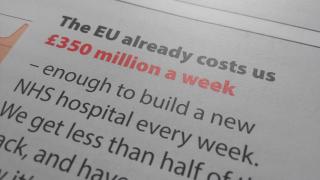
The EU referendum was a damning indictment of the integrity of British political discourse. The two official campaigns both made exaggerated and misleading assertions and, in some cases, such as Vote Leave’s claim about the £350-million-a-week cost of European Union membership, stretched the truth to beyond breaking point. In their quest to determine the fate of Britain’s membership, politicians played fast and loose with ‘facts’, made contradictory promises and dismissed expertise and evidence.
There has always been an ethical dimension to the words used by politicians. Classical scholars were familiar with the potentially corrupting effects of political discourse, while verbal dishonesty remains central to many citizens’ understandings of political ethics. Indeed, politicians’ tendencies to make empty promises, to say one thing and do another, and to make misleading claims underpin a great deal of the distrust surrounding contemporary politics.
In any liberal democracy, citizens need politicians to commit to a basic level of truthfulness if they are to discover which policy choices best serve their interests and to judge whether or not their representatives are acting faithfully. When politicians intentionally make deceitful claims simply in order to win power, they violate these norms. As the political theorist Mark Warren puts it, “duplicitous speech corrupts the currency of promises and justifications that is the life-blood of democracy”.
To some extent, the post-truth style of campaigning, with its characteristic appeals to emotion and repeated assertions of sometimes-false claims, merely emphasises that politicians’ words have always had ethical implications. Yet, it also represents a moral degeneration in political discourse of the kind more commonly associated with older understandings of corruption.
What might be done to stop the rot? On the one hand, thought clearly needs to be given to the regulation of future referendum campaigns. The dishonesty of some politicians in the lead up to the 2016 referendum broke new grounds in its brazenness. At present, there are no legal sanctions to prevent intentionally false claims being made by official campaigns. There probably needs to be.
On the other hand, thought should also be given to how the standards of political discourse in Britain might be raised more generally. Since 1994, British political ethics have fallen under the purview of the Committee on Standards in Public Life, a body charged with ensuring “the highest standards of probity in public life”. To date, its work has largely reflected modern conceptions of corruption and a concern to prevent the abuse of public office for private gain. But the Committee also has a responsibility to keep any eye on broader ethical issues, which now surely include the conduct of political campaigning.
An inquiry on this subject could usefully establish the nature of the threats posed by post-truth politics, and identify and evaluate ways for enhancing the honesty of political discourse. To be effective, it would need to work as far as possible with political parties and journalists. Compiling evidence and raising awareness would be a service in itself.
Producing concrete recommendations would be challenging, of course. Identifying false claims is relatively straightforward; enforcing or at least encouraging truthfulness, much less so. Changing behaviour would require the use of incentives. For example, political parties’ access to existing public funding could be made dependent on their conduct during election campaigns. But even this step raises obvious concerns about threats to free speech, and there are practical problems in establishing the veracity of claims and in identifying intentional dishonesty.
There are also no silver bullets for addressing an underling cultural problem: politicians and journalists are willing to supply factually incorrect information and voters are willing to consume it. People like to hear claims that accord with what they want to believe; politicians want to provide those claims if it will win them power. Moreover, at a time when many citizens are resentful towards established political institutions, any attempt to police political campaigns could be construed by populist forces as an attack by the establishment against the people.
These difficulties should not prevent a response, however. The corrosive effects of post-truth campaigning and its corrupting influence on the public sphere need to be challenged. Failing to do so would comprise a further corruption of democratic politics.
Photo credit: Abi Begum/CC

